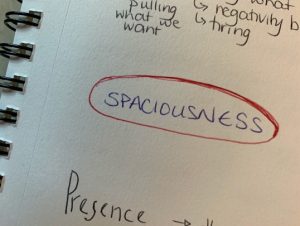On February 27, 2020, I was sitting in a workshop in Melbourne, Australia and wrote this in my notebook:

That’s what I was craving at the time. Some breathing room, both in real and symbolic terms.
Be careful what you wish for! Two weeks later, my calendar was virtually empty. Ten trips cancelled; more than twenty projects postponed.
Fast forward to June 25, 2020. I was finishing a book by poet David Whyte called Crossing the Unknown Sea: Work as a pilgrimage of identity. It had been recommended to me by Digby Scott, and I was preparing for a Wiser by Choice session the next day on work as calling. This phrase, among many other gorgeous ones, jumped off the page: “The real well-being of our person…is measured by a sense of freedom and spaciousness,” as did this one soon after: “Constant busyness has no absence in it, no openness to the arrival of any new season, no birdsong at the start of its day. Constant learning is counterproductive and makes both ourselves and the subject stale and uninteresting.” (176). Ouch.
Spaciousness admittedly feels different when it is chosen than when it is not. A calendar emptied for vacation is not the same as one made void by cancelled conferences and workshops.

Yet we always have a choice in our perspective.
Where do you need to create or welcome more space this week? Maybe in holding room for silence on your Zoom calls or guarding larger gaps between them. Perhaps in your points of view toward certain issues or people. You might need to get out of your house and soak up a wider vista. Get things out of your head and onto paper? It could be literally in lengthening the distance between your ears and your shoulders.
Here’s one thing I’m trying:

Now that my calendar is filling back up, I’ve noticed that I can enjoy Sunday evenings far more if I’ve guarded some breathing space on Monday mornings.
Can you gift yourself with some spaciousness this week?
As David Whyte writes in What to Remember When Waking,
“…there is a small
opening
into the new day
which closes
the moment
you begin
your plans.
What you can plan
Is too small
for you to live.”

